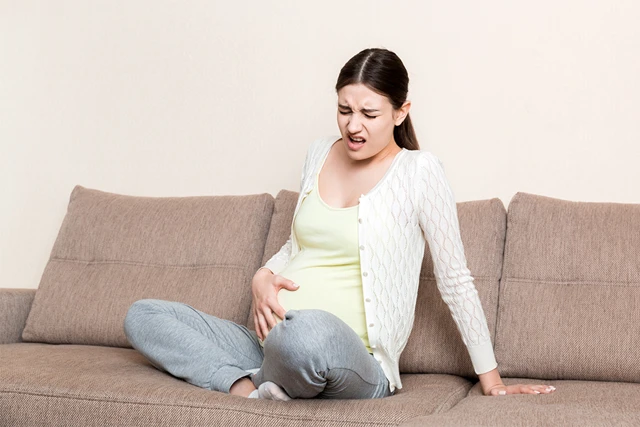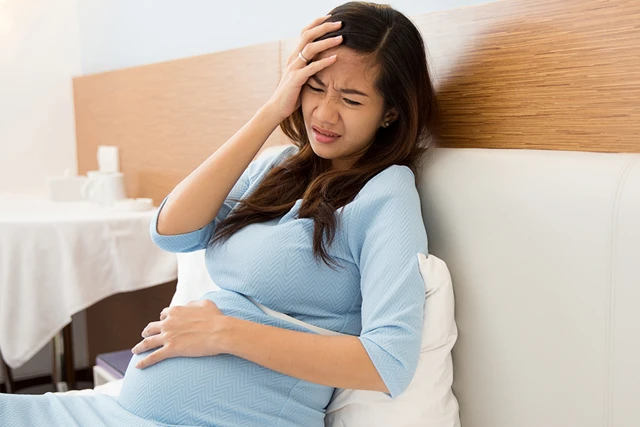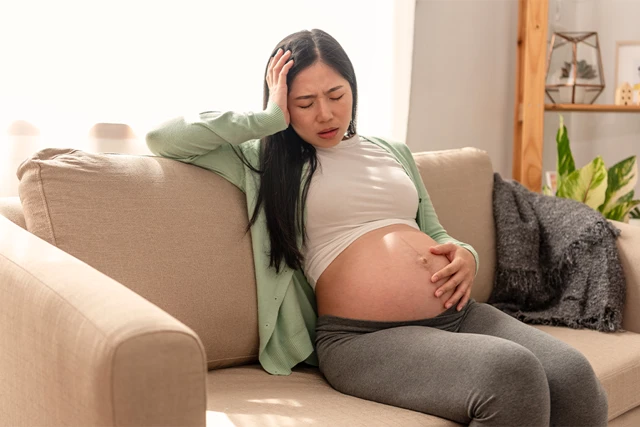
Lower Abdominal Pain in Late Stage of Pregnancy
1. Is Abdominal Pain During Pregnancy Normal?
Abdominal pain is common in early pregnancy as the embryo implants itself into the uterine lining. It may also recur in the third trimester as the uterus stretches to accommodate the growing baby. Some women may also experience heartburn due to acid reflux or skin stretching in the abdominal area. However, in the third trimester, abdominal pain can be caused by more serious conditions, such as:
- Severe pain beyond the pregnant woman’s tolerance
- Pain accompanied by vaginal bleeding
- Persistent abdominal cramping
- Pain along with fever, dizziness, high blood pressure, headaches, shortness of breath, visual disturbances, and fatigue
- Pain with jaundice (yellowing of the skin or eyes) and itching
- Pain with fainting or feeling lightheaded
- Pain with difficulty urinating or blood in the urine
More than four contractions per hour may indicate labor. If this happens before 37 weeks, there’s a high risk of preterm birth. Therefore, pregnant women should not ignore lower abdominal pain in the final months of pregnancy. If any of these warning signs occur, consult a healthcare provider immediately to prevent risks to both mother and baby. Regular prenatal checkups, a balanced diet, and a healthy lifestyle are essential for a safe pregnancy.
Lower Abdominal Pain in Late Stage of Pregnancy
2. Causes of Lower Abdominal Pain in the Third Trimester
Mothers often worry about preterm labor when they experience lower abdominal pain late in pregnancy. This type of pain can feel different from typical pregnancy discomfort. One of the most common sources of confusion is false labor contractions—also known as Braxton Hicks contractions. So, how can you tell the difference? Here are possible causes of abdominal pain during the third trimester:
2.1. Signs That Labor Is Approaching
If you're experiencing frequent abdominal pain, fluid leakage (possible amniotic fluid), lower back pain, or the loss of the mucus plug, it could be a sign that labor is near. Stay calm and contact your healthcare provider for guidance.
2.2. Braxton Hicks Contractions (False Labor)
False labor contractions, also known as Braxton Hicks contractions, can occur during the second or third trimester. Braxton Hicks contractions typically last from 30 seconds to 1 minute and cause the expectant mother to feel tightening and pain in the lower abdomen, but they do not lead to cervical dilation. Braxton Hicks contractions in pregnant women during the third trimester are a normal sign, so mothers should not feel worried or scared.
Pregnant women experience continuous and prolonged abdominal pain in the last months of pregnancy. Symptoms include amniotic fluid leakage, mucus plug rupture, and back pain. When determining the condition, the mother should quickly go to the hospital if there are signs of labor. Constipation
Pregnant women often have poor appetite, and sometimes uncontrollable cravings. Constipation in pregnant women can be caused by unscientific eating, lack of nutrients, and overeating. Severe pain in the lower abdomen can also be caused by the uterus constantly pressing on the intestinal wall or rapidly increasing progesterone levels, reducing intestinal motility. Pregnant women need to establish a gentle, appropriate diet and exercise regimen to deal with this condition.
2.3. Liver and Gallbladder Issues
Pain in the upper right abdomen may be related to liver or gallbladder problems. Symptoms include nausea, vomiting, jaundice, and itching—often caused by intrahepatic cholestasis of pregnancy (ICP), triggered by hormonal changes. If symptoms include pale stools and severe pain, pancreatitis may be the cause. In such cases, hospitalization may be required to ensure safety.
2.4. Skin Stretching
As the uterus expands, the skin on the abdomen stretches. This can cause external skin pain and itching, rather than deep abdominal pain. Gentle massage, warm baths, and moisturizing creams may help relieve the discomfort.
2.5. Acid Reflux and Bloating
Heartburn affects 17%–45% of pregnant women. The growing baby places pressure on the stomach, increasing the likelihood of acid reflux. If you experience burning in your chest or pain behind the breastbone, acid reflux may be to blame. Over-the-counter remedies, smaller meals, and avoiding acidic foods can provide relief.
2.6. Dull abdominal pain due to the mother doing too much
Strenuous activities like climbing stairs, walking long distances, or lifting heavy objects can lead to dull abdominal pain and increase the risk of preterm labor or water breaking early. Reduce physical effort and consult a doctor if the pain recurs frequently.
Lower Abdominal Pain in Late Stage of Pregnancy
3. Is Abdominal Pain in the Third Trimester Dangerous?
At weeks 29, 30, or 32, abdominal pain is usually harmless and may be caused by constipation, pelvic stretching, Braxton Hicks contractions, muscle cramps, fetal movements, or physical activity. These pains often subside with dietary changes and proper rest. However, persistent or intensifying pain could be a warning sign of something serious.
Some possible complications include:
Placental Abruption: This occurs when the placenta detaches from the uterus before delivery. Symptoms include vaginal bleeding, sharp abdominal pain, and a firm uterus. This is a medical emergency that poses serious risks to both mother and baby.
Urinary Tract Infection (UTI): Common in pregnancy, UTIs cause lower abdominal pain, painful urination, frequent urination, cloudy or foul-smelling urine, and fever. If left untreated, they can lead to preterm labor or sepsis, severely affecting both mother and fetus.
Pregnant women need to closely monitor symptoms and check up when there are unusual signs to ensure the safety of both mother and baby.
4. How to Relieve Lower Abdominal Pain in the Third Trimester
During the eighth month, abdominal pain is common due to several reasons, especially constipation. Here are the ways to reduce discomfort and improve well-being:
- Drink plenty of water: Aim for at least 2 liters per day, divided into small portions, about 250ml each time, to stay hydrated and aid digestion.
- Add fiber and magnesium-rich milk to your diet: These nutrients support healthy bowel movements. Consider switching to fiber-fortified milk and eating more fruits and vegetables.
- Increase intake of calcium, vitamins, and minerals: Fiber helps keep your digestive system running smoothly, while vitamins and minerals support overall health and fetal development.
- Avoid spicy, fatty, oily, and salty foods: Such foods may lead to constipation and bloating, making abdominal pain worse.
- Wear loose-fitting clothes: Avoid wearing tight clothing as it can put pressure on the abdomen, affect fetal development and cause discomfort for the mother.
- Engage in light physical activity: Prenatal yoga, Pilates, and Kegel exercises are excellent choices to stay healthy and prepare for labor. Always exercise within your limits.
Additional Tips for the Final Month of Pregnancy:
- Monitor abdominal pain for unusual patterns
- Move gently and avoid physical strain
- Maintain a relaxed state of mind and get enough sleep
- Avoid sexual activity to lower the risk of early labor
Lower abdominal pain in the last month is often a sign of healthy fetal development, but should still be closely observed for potential complications.
Lower Abdominal Pain in Late Stage of Pregnancy
Conclusion
Pregnant women should closely monitor abdominal pain. If the pain is intense, long-lasting, or accompanied by vaginal bleeding or frequent contractions that don't subside, seek medical attention immediately to ensure the safety of both mother and baby.
Maintaining a balanced diet, a healthy lifestyle, and attending regular prenatal appointments are vital, especially in the final trimester. This article on “Is Lower Abdominal Pain in the Third Trimester Dangerous?” offers helpful insights for expectant mothers.
Above all, stay calm, don’t panic, and take proactive steps to manage any symptoms. Wilimedia wishes you a healthy pregnancy and invites you to follow us for more trusted health information for moms-to-be!
Website: https://wilimedia.co
Fanpage: https://www.facebook.com/wilimediaen
Email: support@wilimedia.co
